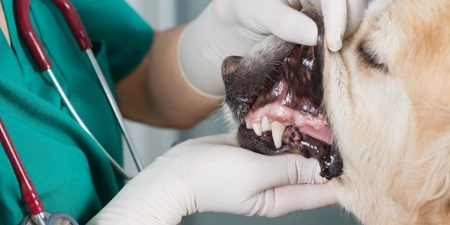Why Is Your Pet's Oral Health Important
A pet's oral health is essential to their wellbeing. Without proper dental care, your pet's mouth can be susceptible to various illnesses or infections. It is vital that you bring your pet in once a year for regular dental checkups and cleanings with us!
Facts You Should Know:
• More than 7 in 10 cats and almost 9 out of 10 dogs over the age of 3 years suffer from some periodontal disease.
• Dogs and cats suffer from dental disease more often than any other ailment, including heart or respiratory conditions.
• Dental disease causes damage to heart valves, the liver, and the lungs within a few years if left untreated.
• Most animals show little or no symptoms of dental disease. They keep eating, playing with their toys, and wagging their tails when you get home. Except when teeth need to be removed, of course. In fact, it's a good idea to talk about dental disease with your veterinarian and get their teeth professionally cleaned and examined before having any teeth removed.
Signs & Symptoms of Pet Dental Disease
It's hard to tell how a dog feels, especially when they're in pain. But you can tell if your dog has dental disease. Check out these signs and symptoms:
- Bad breath that won't go away, even with regular brushing and cleaning
- Grinding of teeth at night
- Loose or broken teeth
- Bloody, red, or swollen gums
- Brown, yellow or discolored teeth
- Excessive drooling, abnormal chewing, or dropping food from the mouth
- Difficulty or refusing to eat
- Gums bleeding swelling in areas around the mouth
- Favoring one side of the mouth whilst eating Swallowing food instead of chewing
- Pawing of the mouth and face
When your pet has dental problems, it may seem irritable because it can't express pain. Let our staff examine your pet if it's acting unusual. Also, Be careful if you examine your pet's mouth because they may bite you if they experience pain.
Some Causes of Pet Dental Disease
Several different factors can cause dental disease, and some of them are listed here. Should your pet have any of the following symptoms, please bring them in for a checkup.
- Loose teeth, broken teeth, and infected roots
- Abscesses, tumors, or cysts in the mouth
- Periodontal disease
- Misalignment of the teeth and bite or malocclusion
- A fractured or broken jaw
- Cleft palate or other palate defects
Our Pet Dental Services
We believe a complete exam, including root planning and charting, is the cornerstone of good dental care, followed by a thorough cleaning above and below the gumline. Anesthesia is used to sedate your pet to make him or her more comfortable as well as protect the veterinarian during the procedure. Animals can experience stress during a dental exam, and this may cause them to act out or misbehave.
Your pet's dental care includes:
- Using a probe, oral examinations under anesthesia will be performed to chart pocket depth
- Diagnosis of periodontal disease and treatment options
- X-rays if needed
- Scaling below the gum line, which is not possible without general anesthesia
- Surgical flap tooth extractions if they are needed
- Polishing and Irrigation
Dental Care You Can Do At Home
We will carefully examine your pet's teeth during regular checkups, but it is important that you help with your pet's dental hygiene between visits. Please ask us for recommendations on how to care for your pet's teeth at home.
As you already know, brushing your pet's teeth is not always possible, and your pet may not be very cooperative about it! Even so, there are ways of helping keep your pet's teeth clean and healthy with dental products such as rinses, treats, and chew toys.
Tip: Ideally, you should begin brushing your pet's teeth when it is still a puppy or kitten. By doing so, you are training him/her to be more cooperative.
Call (+254)79777779 to schedule an appointment
-
Contact Us
-
09 Mayfair Maisonettes, A2,
Westlands, Nairobi, Kenya
(+254) 797 777179
[email protected]
-
-
About
-
Westlands Vet Clinic is focused on furnishing you and your pets with the very best in veterinary treatment. We will work with you every step of the way to create symptomatic, treatment, and preventive designs that best meet the individualized needs of your pet.
-
Made with ![]() by The Best Marketing Shop
by The Best Marketing Shop

